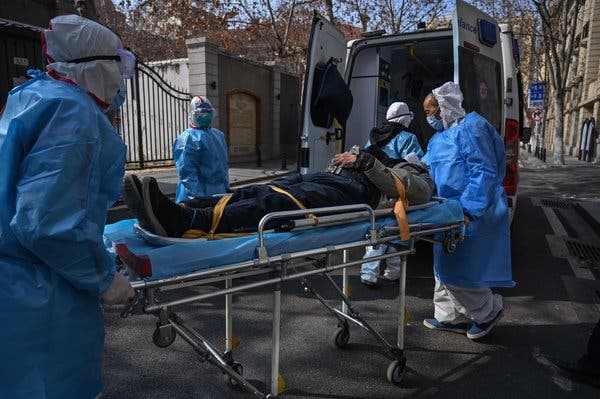Here’s what you need to know:

China now has more cases of the virus than it had of SARS — but comparing the two is tricky.
Cases of the mysterious new coronavirus in mainland China now outnumber the infections that China saw during the entire SARS outbreak of 2002 and 2003, officials said on Thursday.
SARS, or severe acute respiratory syndrome, ultimately killed 774 people in 17 countries. The Chinese authorities were criticized for their response to that epidemic, which began inside its borders.
By Thursday, the number of confirmed cases of the new coronavirus had risen to 7,711 worldwide, according to Chinese officials and the World Health Organization. All but 68 of those infections have been in mainland China.
Experts cautioned that comparing the two diseases was difficult. Tracking SARS infections was complicated by a dearth of testing equipment and a lack of transparency among local politicians and the central government. While officials say China has made progress on those fronts, similar concerns threaten to undermine an accurate count of infections from the new coronavirus, known to scientists as 2019-nCoV.
Preliminary figures suggest the new coronavirus is less likely to result in death than SARS, which killed 1 in 10 infected patients, but it is still too early to paint a full picture of its mortality rate.
By comparison, MERS, Middle East Respiratory Syndrome, another coronavirus, killed 1 in 3 patients. The mortality rate of seasonal flu is about 1 in 1,000.
170 people have died. More than 7,711 cases have been confirmed.
◆ Thirty-eight more deaths in China from the coronavirus were announced on Thursday, bringing the toll to 170. Most of those recent deaths, 37, occurred in Hubei Province, the center of the outbreak. One person died in the southwestern province of Sichuan.
◆ Another 1,737 new cases were recorded in the past 24 hours for a total of 7,711 worldwide, according to Chinese officials and the World Health Organization. The real number is likely to be higher.
◆ Tibet reported its first confirmed case. This means that all of China’s provinces and territories have now been touched by the outbreak.
◆ Thailand has reported 14 cases of infection; Hong Kong has 10; the United States, Taiwan, Australia and Macau have five each; Singapore, South Korea and Malaysia each have reported four; Japan has 11; France has five; Germany has four; Canada has three; Vietnam has two; and Nepal, Cambodia and the United Arab Emirates each have one.
◆ Cases recorded in Taiwan, Germany, Vietnam and Japan involved patients who had not been to China. There have been no reported deaths outside China.
Australia plans to quarantine citizens on a remote island.
Australia said it would quarantine its citizens evacuated from Wuhan, China, the epicenter of the outbreak, for two weeks on an island 2,000 miles off the coast of mainland Australia, amid global fears that the spread of the virus will accelerate.
Six people in Australia, all of whom recently spent time in China, have already been diagnosed with the new coronavirus. But there are also about 600 Australian citizens trapped in Hubei Province, where Wuhan and other cities have effectively been under lockdown for a week.
The government said it would transport those “isolated and vulnerable” people to Christmas Island, the site of a detention camp used for housing illegal immigrants and asylum-seekers.
Timing for the evacuation remains uncertain as the government awaits approval from China. Officials said Qantas Airways would facilitate the evacuation.
Christmas Island, which is near the Indonesian island of Java, has played an important but checkered role in Australia’s contentious use of faraway sites to house refugees and other migrants. Some Australians questioned the implications of using the island as a quarantine site.
Last year, the government reopened a detention center on the island, in a bid to counter legislation that would let sick detainees seek treatment on the mainland.
Moving people to Christmas Island is not an “appropriate solution,” Dr. Tony Bartone, the president of the Australian Medical Association, said in a television news interview, adding that the government had other facilities it could use, such as military sites.
People trapped in Wuhan said they were torn between staying in China or spending two weeks at a remote detention facility.
“I have mixed feelings about it,” Daniel Ouyang, an Australian who visited Wuhan for the Lunar New Year holiday, told the Australian Broadcasting Corporation.
The government, he said, had not been forthcoming about what conditions they should expect on the island. “What’s going to happen to our freedom?” he asked.
“Christmas Island for 14 days is a long time,” Bon Lee, a Sydney man in Hubei Province, told The Sydney Morning Herald. “It’s a drastic measure.”
Mask hoarders may raise the risk of an outbreak in the United States.
American stores are selling out of masks, and health care workers risk infection if they cannot get the protective gear.
Some popular sellers on Amazon say deliveries will be delayed for weeks.
Masks are thought to slow the spread of disease when they are worn by sick people in crowded places like emergency rooms, offices, subways and buses. By containing coughs and sneezes, masks stop virus-laden droplets from being spewed into the air and onto nearby surfaces.
Hoarding by the healthy means that hospitals, clinics and doctors’ offices could run out. Doctors and nurses treating patients for respiratory infections should wear masks and replace them often — as soon as they become soggy, according to the Centers for Disease Control and Prevention.
The C.D.C. is reaching out to manufacturers to prevent shortages, especially in hospitals, an agency official said.
Reporting was contributed by Russell Goldman, Austin Ramzy, Alexandra Stevenson, Daisuke Wakabayashi, Karen Weise and Mike Isaac. Elsie Chen, Zoe Mou, Albee Zhang, Amber Wang, Yiwei Wang and Claire Fu contributed research.

